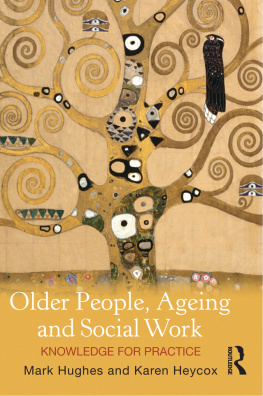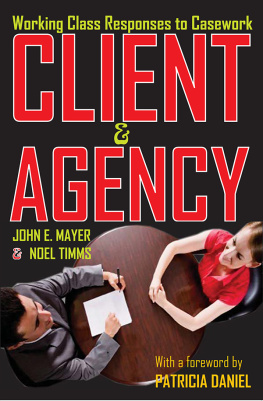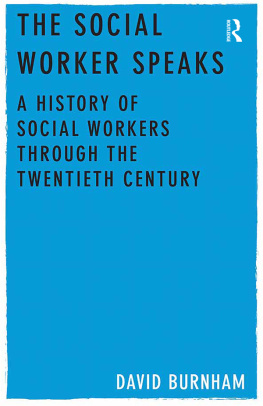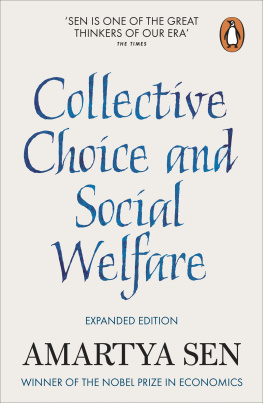NATIONAL INSTITUTE SOCIAL SERVICES LIBRARY
Volume 14
HELPING THE AGED
First published in 1970 by George Allen & Unwin Ltd
This edition first published in 2022
by Routledge
2 Park Square, Milton Park, Abingdon, Oxon OX14 4RN
and by Routledge
605 Third Avenue, New York, NY 10158
Routledge is an imprint of the Taylor & Francis Group, an informa business
1970 George Allen & Unwin Ltd
All rights reserved. No part of this book may be reprinted or reproduced or utilised in any form or by any electronic, mechanical, or other means, now known or hereafter invented, including photocopying and recording, or in any information storage or retrieval system, without permission in writing from the publishers.
Trademark notice: Product or corporate names may be trademarks or registered trademarks, and are used only for identification and explanation without intent to infringe.
British Library Cataloguing in Publication Data
A catalogue record for this book is available from the British Library
ISBN: 978-1-03-203381-5 (Set)
ISBN: 978-1-00-321681-0 (Set) (ebk)
ISBN: 978-1-03-205425-4 (Volume 14) (hbk)
ISBN: 978-1-03-205445-2 (Volume 14) (pbk)
ISBN: 978-1-00-319753-9 (Volume 14) (ebk)
DOI: 10.4324/9781003197539
Publishers Note
The publisher has gone to great lengths to ensure the quality of this reprint but points out that some imperfections in the original copies may be apparent.
Disclaimer
The publisher has made every effort to trace copyright holders and would welcome correspondence from those they have been unable to trace.
FIRST PUBLISHED IN 1970
This book is copyright under the Berne Convention. All rights are reserved. Apart from any fair dealing for the purpose of private study, research, criticism or review, as permitted under the Copyright Act, 1956, no part of this publication may be reproduced, stored in a retrieval system, or transmitted, in any form or by any means, electronic, electrical, chemical, mechanical, optical, photocopying recording or otherwise, without the prior permission of the copyright owner. Enquiries should be addressed to the publishers.
George Allen & Unwin Ltd 1970
ISBN 0 04 362019 I CASED
ISBN 0 04 362020 5 PAPER
PRINTED IN GREAT BRITAIN
in 11 on 12 point Fournier Type
BY COX AND WYMAN LTD
FAKENHAM
RESEARCH TEAM
E. Matilda Goldberg, a.a.p.s.w. Director of Research
Mary B. Speak, b.sc, ph.d Statistician
Phyllis E. Baldock, b.a., a.i.m.s.a. Social Work Assessor
Ann Mortimer, b.a. Social Work Assessor
Brian T. Williams, m.b., b.s., d.p.h., d.p.m. Medical Assessor
Edith K. M. Harrison, a.a.p.s.w. Social Worker
Michael G. Picardie, b.a., a.a.p.s.w. Social Worker
Anne Vickery, a.a.p.s.w. Social Work Interviewer
Elizabeth A. Howe, Statistical Assistant
Mair Wynn Griffiths, Administrative Secretary
Computer Analysis by Whitde Data Services
ADVISORY COMMITTEE
Chairman: Mr R. Huws Jones, c.b.e., m.a., b.sc (ECON.)
A. N. Exton-Smith, m.a., m.d., m.b., b.chir., f.r.c.p.
Mr J. T. Gregory, d.p.a., a.i.s.w.
Miss E. L. Hope-Murray, o.b.e.
Professor A. R. Ilersic, b.com., m.sc. (ECON.)
Professor J. N. Morris, m.a., d.sc, f.r.c.p., d.p.h.
F. Post m.d., m.b., b.s., f.r.c.p., d.p.m.
Miss B. B. Sheldon, a.i.m.s.w.
G. W. H. Townsend, c.b.e., m.b., b.ch., b.a.o., d.p.h., d.p.a.
Professor P. B. Townsend, b.a.
M. D. Warren, m.d., m.r.c.p., d.p.h., d.i.h.
PART I Objectives and Methods
THE OBJECTIVES OF SOCIAL WORK - CAN THEY BE DEFINED AND ASSESSED?
In our affluent welfare state social workers are in great demand and their numbers are steadily increasing as expectations of improved social conditions and better physical and mental health continue to rise. The Seebohm Report (H.M.S.O. 1968) pointed to many gaps and deficiencies in the personal social services and argued forcibly for an extension of social work services and their greater unity and autonomy. Increasing resources are devoted to the training of social workers. Social workers are progressing towards a professional entity with the founding of the British Association of Social Workers. Social work has arrived.
At the same time there has been a swelling chorus of voices asking: What is social work? What do social workers do and how effective are they?
Among the first determined voices to be heard was Barbara Woottons, some ten years ago (Wootton 1959). She observed that in a very few years practically the whole profession has succeeded in exchanging the garments of charity for a uniform borrowed from the practitioners of psychological medicine. She suggested that the modern social worker (like her Victorian predecessor) was confusing economic difficulties with personal failure and misconduct and that undue attention to the casework process and the casework relationship was deflecting attention away from problems created by evil environments. Since the modern social worker saw her concern to be with psychological maladjustment rather than material need, she found it harder to say what she was driving at.
More recently, with the rediscovery of poverty as a primary evil and a respectable complaint worthy of attention in its own right, doubts about the methods employed by social workers and especially by caseworkers, about the objectives they pursue and the effectiveness of their efforts, have become more insistent on both sides of the Adantic.
In America social workers have been accused of deploying their resources where they are least needed, of neglecting the poor and the severely disordered, putting commitment to a method before human needs, methods, moreover, which have not been shown to be effective (Scott Briar 1968). Like Wootton, Scott Briar takes social workers to task for retreating from an array of functions as social brokers, advocates, reformers and participants in social policy to the one exclusive function as therapists, adopting a psychiatric disease model, as their frame of reference. He argues that casework methods are based on explanatory theories which do not provide knowledge of how to change conditions.
Meyer and his colleagues, in their famous field experiment in social work with adolescent girls, have criticized the almost exclusive concentration of the caseworkers dealing with these girls on self-understanding and on attitudes (Meyer et al. 1965). They suggest that social work might achieve better results if it was directed towards helping clients to change their situations and their goals.
In Great Britain, Sinfield (1969) in a recent Fabian pamphlet also deplores the narrow interpretation of the modern social workers role and the professions tendency to look inward into its own processes which, in his view, leads to neglect of the clients views and of the goals to be achieved. He thinks that social workers fail to validate techniques because they often assume that they are checking their own work in the process of casework itself. The criteria for success therefore, Sinfield argues, are the social workers own and not their clients. This view is confirmed, to a limited extent, by studies of medical social workers, who expressed dissatisfaction with their efforts as they were not able to use their casework skills to the full (Moon 1965, Butrym 1968). However, the clients in Butryms study expressed considerable satisfaction about the support and practical help they had received from the medical social workers.






